Texas Trying To Force Students To Stand For Pledge Of Allegiance
The State of Texas is arguing in Court that a school district can force a student to stand for the Pledge of Allegiance. This is a blatant violation of the First Amendment.
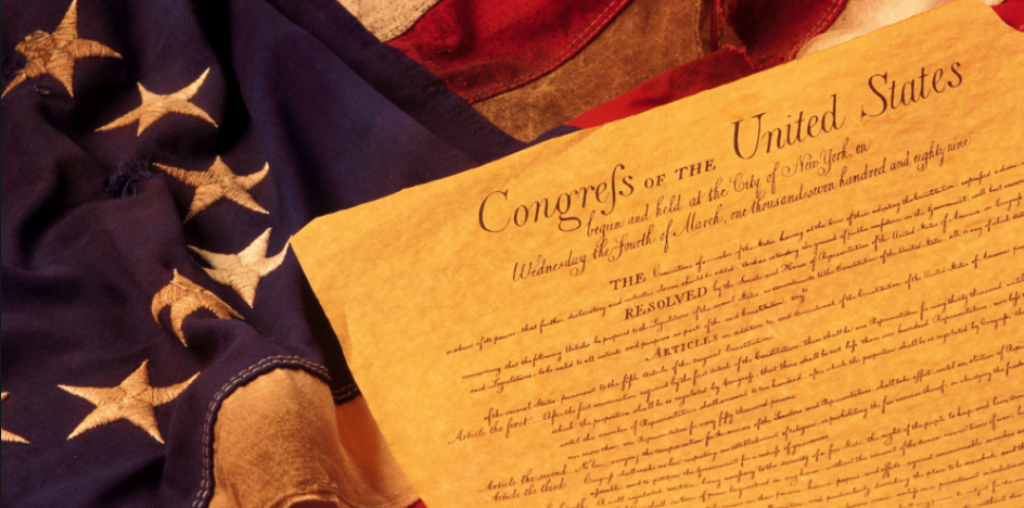
The state of Texas is arguing in Court that a student can be required to stand for the Pledge of Allegiance notwithstanding a long history of Supreme Court precedent that appears to argue otherwise:
Last October, then-17-year-old India Landry was in the principal’s office of her Texas high school when the school intercom crackled. It was time for the Pledge of Allegiance.
Her classmates stood nearly in unison all over Windfern High School, outside Houston. But Landry stayed seated and did not recite it. Principal Martha Strother, according to court filings, immediately took action. “Well, you’re kicked outta here,” she told Landry.
The school secretary keyed on the symbolism of the act by Landry, who is black.
“This isn’t the NFL,” she said, the filing shows, connecting Landry’s actions to protests led by former quarterback Colin Kaepernick, who knelt during the national anthem to protest police brutality.
Landry was expelled, but then was allowed back into school days later, court filings show.
A long legal battle ensued between Landry, now 18, and school district officials. The suit was filed by Landry’s mother, Kizzy Landry, who claimed the school violated constitutional protections of free speech, due process and equal protection.
Now, the Texas attorney general has intervened in the federal case and defended a Texas law that Landry has challenged as unconstitutional. It requires students to recite the pledge, or get a parent’s or guardian’s permission if they wish to opt out.
“Requiring the pledge to be recited at the start of every school day has the laudable result of fostering respect for our flag and a patriotic love of our country,” Attorney General Ken Paxton saidTuesday. Twenty-six other states have similar statutes, Paxton said.
His comment included a not-so-subtle nod to a popular Republican attack on the NFL protests echoed by President Trump — that they disrespect the U.S. flag and, by extension, U.S. troops and veterans.
Landry’s attorney, Randall Kallinen, a civil rights lawyer and former president of the Houston ACLU chapter, said the conversation around the protests and political firestorm that ensued is important context.
Ten days before Landry refused to stand and recite the pledge, Trump suggested that NFL owners should fire players who kneel. It was one of the more prominent moments of the debate around the protests.
“Before this case, never one time did I hear of any school forcing kids to stand for the Pledge of Allegiance,” Kallinen told The Washington Post on Wednesday, citing thousands of requests for assistance in his career. “Then, in two weeks, I had three calls.”
Kallinen described the decision and wording of Paxton’s announcement as politically motivated to galvanize conservative voters ahead of the November elections.
A spokeswoman for Paxton did not return a request for comment.
(…)
Last spring, Landry’s refusal prompted a teacher to send her out of class, and another sent her to the principal’s office. Attorneys for the school district did not immediately return calls for comment.
“I felt the flag doesn’t represent what it stands for, liberty and justice for all, and I don’t feel what is going on in the country, so it was my choice to remain seated, silently. It was a silent protest,” Landry told NBC Houston in July.
That came after the judge denied requests from the Cypress-Fairbanks Independent School District to dismiss the case.
According to the lawsuit, the school’s assistant principal told India that she “was going to stand for the pledge like the other African American in her class.” Principal Strother also suggested that Landry write about black justice issues instead of refusing to stand.
Dominic Holden at Buzzfeed has more:
The state of Texas inserted itself into a lawsuit in federal court Tuesday to help argue that a black high school student was required to stand for the Pledge of Allegiance, once again kicking the political football of flag protests into play weeks before the fall election.
NFL players who have taken a knee during the national anthem to protest racial discrimination loom large over the case, which began when India Landry sued the Cypress-Fairbanks Independent School District last fall after school officials threatened to expel her for remaining seated during the Pledge of Allegiance.
Landry — then 17, now 18 — was attending Windfern High School in Houston last fall, where she had abstained from the Pledge of Allegiance more than 200 times without a problem, she said in a complaint filed in federal court. But on Oct. 2, 2017, she was in Principal Martha Strother’s office when she refused to stand during the pledge. “Principal Strother upon seeing this immediately expelled India from school saying ‘Well you’re kicked outta here,'” the complaint continues, adding that a school secretary then added, “This is not the NFL.”
On Tuesday, Texas Attorney General Ken Paxton, a Republican up for reelection in November, filed a brief in US District Court for the Southern District of Texas on behalf of the state, asking a federal judge for permission to argue against the student in order to defend a state law that mandates parental permission for students who sit out the pledge.
“Requiring the pledge to be recited at the start of every school day has the laudable result of fostering respect for our flag and a patriotic love of our country,” Paxton said in a statement. “This case is about providing for the saying of the pledge of allegiance while respecting the parental right to direct the education of children.”
But the student’s lawyer, Randall Kallinen, told BuzzFeed News that he believes Paxton’s moves are political.
“It’s election time,” said Kallinen, adding that, while the state can defend its laws by joining lawsuits, the press announcement was designed to get votes. “This is to further their Republican values.”]
(…)
On Oct. 5, Landry and her mother, Kizzy Landry, attended a meeting with the principal, who said India must stand for the pledge to be let back in at Windfern High School. “Principal Strother said that sitting was disrespectful and would not be allowed,” according to the complaint. “Principal Strother suggested that India write about justice and African Americans being killed. Ms. Strother then said the meeting is over and if India does not stand for the Pledge she cannot return to Windfern.”
A cascade of lawsuits over the Pledge of Allegiance has risen through US courts for decades, most notably West Virginia State Board of Education v. Barnette, in which the Supreme Court held a student could sit out the pledge in protest. However, the issue in Texas and some other states is more nuanced. In Florida, which also has a law that requires parental permission for students to opt out of the pledge, a lower court judge ruled in a student’s favor. But later, the Circuit Court of Appeals for the 11th Circuit issued a mixed ruling, largely reversing the lower court. It found that a student could skip the pledge, but it ruled the parental permission law was not unconstitutional on its face.
As Paxton pointed out in the Texas brief Tuesday, the Texas Legislature enacted Texas Education Code Section 25.082(b), which states, “[t]he board of trustees of each school district … shall require students, once during each school day at each campus, to recite … the pledge of allegiance to the United States flag in accordance with 4 U.S.C. § 4.”
“Texans also recognize that a critical aspect of the liberty guaranteed by the United States Constitution — and represented by the United States flag — is a parent’s right to direct the education and upbringing of his or her children,” the Texas brief said. “A State may act to protect that interest, and the Texas Legislature did so by giving the choice of whether an individual student will recite the Pledge to the student’s parent or guardian.”
The legal issues here couldn’t possibly be more clear, as a matter of fact, and stretch back 71 years to a Supreme Court decision that has served as the basis for most modern First Amendment law. In that case, West Virginia Board of Education v. Barnette, the Supreme Court dealt with sisters who were expelled from school for refusing to comply with a state law that required all students to recite the Pledge of Allegiance each day. In a 6-3 opinion, the Court ruled that the law was unconstitutional and that no student could be forced to recite the Pledge:
There is no doubt that, in connection with the pledges, the flag salute is a form of utterance. Symbolism is a primitive but effective way of communicating ideas. The use of an emblem or flag to symbolize some system, idea, institution, or personality, is a short cut from mind to mind. Causes and nations, political parties, lodges and ecclesiastical groups seek to knit the loyalty of their followings to a flag or banner, a color or design. The State announces rank, function, and authority through crowns and maces, uniforms and black robes; the church speaks through the Cross, the Crucifix, the altar and shrine, and clerical reiment. Symbols of State often convey political ideas just as religious symbols come to convey theological ones. Associated with many of these symbols are appropriate gestures of acceptance or respect: a salute, a bowed or bared head, a bended knee. A person gets from a symbol the meaning he puts into it, and what is one man’s comfort and inspiration is another’s jest and scorn.
Over a decade ago Chief Justice Hughes led this Court in holding that the display of a red flag as a symbol of opposition by peaceful and legal means to organized government was protected by the free speech guaranties of the Constitution. Stromberg v. California, 283 U.S. 359 , 51 S.Ct. 532, 73 A.L.R. 1484. Here it is the State that employs a flag as a symbol of adherence to government as presently organized. It requires the individual to communicate by word and sign his acceptance of the political ideas it thus bespeaks. Objection to this form of communication when coerced is an old one, well known to the framers of the Bill of Rights. 13
It is also to be noted that the compulsory flag salute and pledge requires affirmation of a belief and an attitude of mind. It is not clear whether the regulation contemplates that pupils forego any contrary convictions of their own and become unwilling converts to the prescribed ceremony or whether it will be acceptable if they simulate assent by words without belief and by a gesture barren of meaning. It is now a commonplace that censorship or suppression of expression of opinion is tolerated by our Constitution only when the expression presents a clear and present danger of action of a kind the State is empowered to prevent and punish. It would seem that involuntary affirmation could be commanded only on even more immediate and urgent grounds than silence. But here the power of compulsion is invoked without any allegation that remaining passive during a flag salute ritual creates a clear and present danger that would justify an effort even to muffle expression. To sustain the compulsory flag salute we are required to say that a Bill of Rights which guards the individual’s right to speak his own mind, left it open to public authorities to compel him to utter what is not in his mind.
Whether the First Amendment to the Constitution will permit officials to order observance of ritual of this nature does not depend upon whether as a voluntary exercise we would think it to be good, bad or merely innocuous. Any credo of nationalism is likely to include what some disapprove or to omit what others think essential, and to give off different overtones as it takes on different accents or interpretations. 14 If official power exists to coerce acceptance of any patriotic creed, what it shall contain cannot be decided by courts, but must be largely discretionary with the ordaining authority, whose power to prescribe would no doubt include power to amend. Hence validity of the asserted power to force an American citizen publicly to profess any statement of belief or to engage in any ceremony of assent to one presents questions of power that must be considered independently of any idea we may have as to the utility of the ceremony in question.
(…)
The very purpose of a Bill of Rights was to withdraw certain subjects from the vicissitudes of political controversy, to place them beyond the reach of majorities and officials and to establish them as legal principles to be applied by the courts. One’s right to life, liberty, and property, to free speech, a free press, freedom of worship and assembly, and other fundamental rights may not be submitted to vote; they depend on the outcome of no elections. [319 U.S. 624, 639] In weighing arguments of the parties it is important to distinguish between the due process clause of the Fourteenth Amendment as an instrument for transmitting the principles of the First Amendment and those cases in which it is applied for its own sake. The test of legislation which collides with the Fourteenth Amendment, because it also collides with the principles of the First, is much more definite than the test when only the Fourteenth is involved. Much of the vagueness of the due process clause disappears when the specific prohibitions of the First become its standard. The right of a State to regulate, for example, a public utility may well include, so far as the due process test is concerned, power to impose all of the restrictions which a legislature may have a ‘rational basis’ for adopting. But freedoms of speech and of press, of assembly, and of worship may not be infringed on such slender grounds. They are susceptible of restriction only to prevent grave and immediate danger to interests which the state may lawfully protect. It is important to note that while it is the Fourteenth Amendment which bears directly upon the State it is the more specific limiting principles of the First Amendment that finally govern this case.
Twenty-six years later, in Tinker v. Des Moines Independent Community School District 393 U.S. 501 (1969), the Court deal with the case involving students who were had been disciplined for taking part in an anti-war protest during the Vietnam War. In its decision, the Court held that the student’s right to express their political beliefs as protected by the First Amendment outweighed any argument the school could make that its actions were necessary to keep discipline and order in the school:
The school officials banned and sought to punish petitioners for a silent, passive expression of opinion, unaccompanied by any disorder or disturbance on the part of petitioners. There is here no evidence whatever of petitioners’ interference, actual or nascent, with the schools’ work or of collision with the rights of other students to be secure and to be let alone. Accordingly, this case does not concern speech or action that intrudes upon the work of the schools or the rights of other students.
Only a few of the 18,000 students in the school system wore the black armbands. Only five students were suspended for wearing them. There is no indication that the work of the schools or any class was disrupted. Outside the classrooms, a few students made hostile remarks to the children wearing armbands, but there were no threats or acts of violence on school premises.
(…)
First Amendment rights, applied in light of the special characteristics of the school environment, are available to teachers and students. It can hardly be argued that either students or teachers shed their constitutional rights to freedom of speech or expression at the schoolhouse gate. This has been the unmistakable holding of this Court for almost 50 years. In Meyer v. Nebraska, 262 U.S. 390 (1923), and Bartels v. Iowa, 262 U.S. 404 (1923), this Court, in opinions by Mr. Justice McReynolds, held that the Due Process Clause of the Fourteenth Amendment prevents States from forbidding the teaching of a foreign language to young students. Statutes to this effect, the Court held, unconstitutionally interfere with the liberty of teacher, student, and parent. 2 See also Pierce v. Society of Sisters, [393 U.S. 503, 507] 268 U.S. 510 (1925); West Virginia v. Barnette, 319 U.S. 624 (1943); McCollum v. Board of Education, 333 U.S. 203 (1948); Wieman v. Updegraff, 344 U.S. 183, 195 (1952) (concurring opinion); Sweezy v. New Hampshire, 354 U.S. 234 (1957); Shelton v. Tucker, 364 U.S. 479, 487 (1960); Engel v. Vitale, 370 U.S. 421 (1962); Keyishian v. Board of Regents, 385 U.S. 589, 603 (1967); Epperson v. Arkansas, ante, p. 97 (1968).
(…)
In our system, state-operated schools may not be enclaves of totalitarianism. School officials do not possess absolute authority over their students. Students in school as well as out of school are “persons” under our Constitution. They are possessed of fundamental rights which the State must respect, just as they themselves must respect their obligations to the State. In our system, students may not be regarded as closed-circuit recipients of only that which the State chooses to communicate. They may not be confined to the expression of those sentiments that are officially approved. In the absence of a specific showing of constitutionally valid reasons to regulate their speech, students are entitled to freedom of expression of their views. As Judge Gewin, speaking for the Fifth Circuit, said, school officials cannot suppress “expressions of feelings with which they do not wish to contend.” Burnside v. Byars, supra, at 749.
It is true that in the years since Barnette and Tinker there have been decisions from the Court that have seemingly eroded student’s First Amendment rights. In both Bethel School District v. Fraser and Hazelwood v. Kuhlmeier, the Court seemed to limit student free speech rights in favor of the ability of school administrators to maintain discipline in the school. However, those two cases are arguably unique given their facts. In the Fraser case, a student had been disciplined after giving a speech to a public assembly that was filled with sexual innuendo. The Hazelwood case, meanwhile, involved the question of how much editorial control a school could have over a student newspaper, and the court was essentially faced with the question of whether or not the Constitution forbade a school from maintaining control over the curriculum of a school activity. More recently, in Morse v. Frederick, the Court had upheld a school’s decision to discipline a student who had unfurled a banner that said “Bong Hits 4 Jesus” despite the fact that there was no evidence that there had been any disruption in school and the fact that the event had actually occurred at an off-campus event. All three events have in common the fact that students were allegedly doing something that disrupted school function and which, unlike Tinker, did not have a political component. In school as in the rest of society, there are limits to freedom of speech when one’s speech is little more than rabble-rousing and disruption.
In arguing in favor of the Constitutionality of the Texas statute, Texas Attorney General Ken Paxton appears to be relying in large part on an Eleventh Circuit Court of Appeals case from 2011 called Frazier ex rel Frazier v. Winn. In that 2011 case, the Court upheld a similarly worded Florida statute that required students to stand for the pledge unless they had written parental permission. The majority in the case, which was apparently never appealed to the Supreme Court, attempted to distinguish the Florida law from Barnette and Tinker by arguing that it was a “parental rights” case and taking the position that parents somehow have the right to prevent their children from exercising their First Amendment rights. This strikes me as being an utterly absurd argument. The rulings in Barnette and Tinker, and even in the cases that have upheld certain school actions that arguably limit student’s rights, seem to be utterly clear in setting forth the proposition that the rights protected by the First Amendment belong to the student, not to the school and not to the parents. If that were not the case, then arguably police would be free to violate other rights protected by Bill of Rights simply by getting parents to waive those rights. While it is true that police can do things such as question minors if their parents allow it, though, the idea that parents can waive their children’s right to counsel, for example, is one that no court would take seriously.
In any case, the parental consent issue here seems to be a non-issue given the fact that Landy is being supported by her parents. Assuming again that the facts as they have been related so far are accurate, it seems clear to me that this Texas case falls in the category of cases like Barnette and Tinker rather than the more recent cases that have seemingly limited student’s rights in some circumstances. Landry was not being disruptive, she was not disrupting class, she was not trying to stop her teachers from having control over the classroom. She was simply sitting in his seat refusing to stand during the Pledge. Since it’s already established that students cannot be forced to say the pledge, it seems axiomatic that it is impermissible to punish them because they refuse to stand while it is recited.

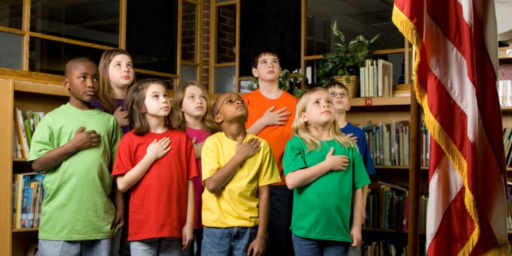

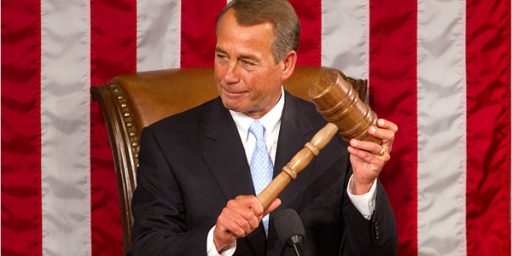
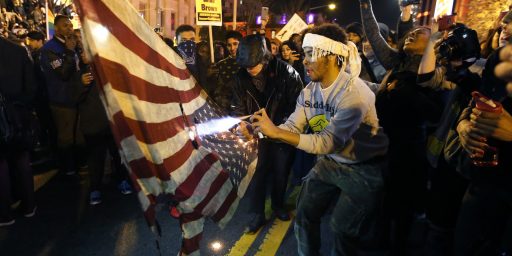
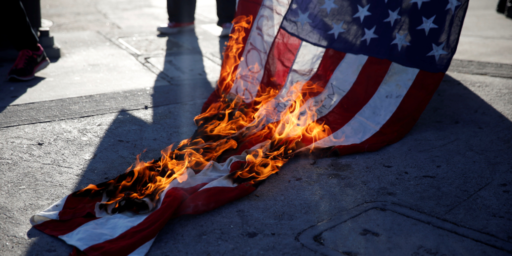
One thing: “She was simply sitting in her seat…”
No, I think this is the usual culture war posturing that Texas can’t seem to stop indulging in. Real message: Black people should do what they’re told so they can appreciate the freedom they have in this great country we call ‘Murica! Gosh darn it, why are they so ungrateful all the time!!!!
I guess some people in Texas would rather live in a country that forces people to act patriotic than a country that inspires people to be patriotic.
Why anyone thinks this should be injected into school is beyond me.
What if a student doesn’t say it “correctly”? What if a student omits the (imo offensively religious phrasing) “under god”? What if a student salutes in the Old Manner? What if a student recites it in another language? How far does the state believe it can go in dictating what a student may or may not do during 30 seconds of faux-patriotic mumbo-jumbo? And if it feels it has control over all behavior during something orthogonal to the learning process, where else does it feel the school may insert ritualistic and controlling nonsense?
I’m still waiting for the day when my kids stop saying it. I’ve encouraged our older daughter to think about the words and ask herself whether it’s something she agrees with – as an atheist (though a 9-year old one at that) there’s at least one phrase that she doesn’t like – and whether it’s something she should say at all if she disagrees with some of it. Baby steps.
I was down in Dallas recently discussing a position with a large company there. Everything looks good and we may come to agreement. Except… I am really struggling coming to terms with spending the next 3-5 years in a Trump state. It’s kind of repulsive…
If kids today are anything at all like they were in my day, many of them will have made satirical/mocking, likely dirty words to the Pledge they’re forced to recite. And a few of them do say the modified words often, if not loudly.
Very OT, but I can’t help but post this comment about Theresa May’s speech at the Tory Conference (Brexit, Brexit, and more Brexit):
@ptfe: Virginia used to have, and probably still does have, a legally required “moment of silence” each day. The intent was obviously to encourage school prayer, but constructed in such a manner as to survive any court challenge.
The Landrys seem way more patriotic than the Texas government. Good on the girl for following her conscience over compulsory speech, and good on her parents for backing her — and not just signing the permission slip.
A lot of people mistake fealty for patriotism, but the parents have raised that kid well.
@Timothy Watson: I’m probably lucky that wasn’t a requirement at my school growing up, as I would have taken it as an encouragement for mime.
I have problems with authority.
@Timothy Watson: FWIW, speaking as someone who is very against the idea of a government mandated school prayer, I think the moment of silence is a great idea and have no problem with anyone who wants to praying silently.
@ptfe:..What if a student doesn’t say it “correctly”?
Republicans: ” We love the flag. It’s the principles it stands for we hate!”
@MarkedMan:..…the moment of silence is a great idea…
The only way a government mandated moment of silence would be worthwhile is if it applied to REPUBLICAN President Pork Chop Pud. Every moment of his tenure.
@Timothy Watson: It’s my understanding that Virginia still allows for it, but it’s not compulsory, unlike the PoA time. (Virginia lets students stand or sit quietly and not say the pledge, but it’s required in all schools. Indeed, a flag is required in all classrooms. Which also seems bizarre.)
I’m generally OK with the “moment of silence”, but teachers need to be well-instructed on what they’re allowed to say about it and how they’re allowed to enforce it. IMO, 30 seconds of undirected silence — and wow would it have to be undirected — would certainly be better than “everyone stand up and say this thing to let your neighbors know you LOVE AMERICA!”
What’s more disturbing is that these things start when the kids are 5 years old. I mean, a 5-year old can’t even figure out the Tooth Fairy.
Ah yes, dawg bless Texas, where wrapping oneself in the flag while shitting on the Constitution is the patriotic thing to do.
At this point I wouldn’t stand for the pledge.
I am sure the Texans strongly support the “one nation, indivisible” line, in light of the side they took in the “War of Northern Aggression”.
Texas is also considering bringing back the Bellamy salute.
@MarkedMan:
Decades ago I saw a TV debate on school prayer. Pat Boone was taking the prayer side, apparently he had been something of an activist. Forget who was the opposition. Boring debate. Boone started out by saying he might see why no one should be forced to pray, but why was his kid prohibited from even saying a silent prayer before a test? His opponent pointed out calmly that not only was no one trying to prohibit his kid from saying a silent prayer, if they wanted to, how could they possibly do so. Boone went “buh, buh” a couple times then had essentially nothing further to say with half an hour of air time to fill.
@PJ: Now that is truly creepy…
@Moosebreath: This has always been remarkable to me. The people that are most adamant about saying the pledge of allegiance are usually the same people all in a tizzy about some statue of a rebel who killed American soldiers in order to set up a slave holding separate country.
People are strange…
There certainly is no patriotism like forced/fake patriotism…these school personnel and politicians are pathetic…